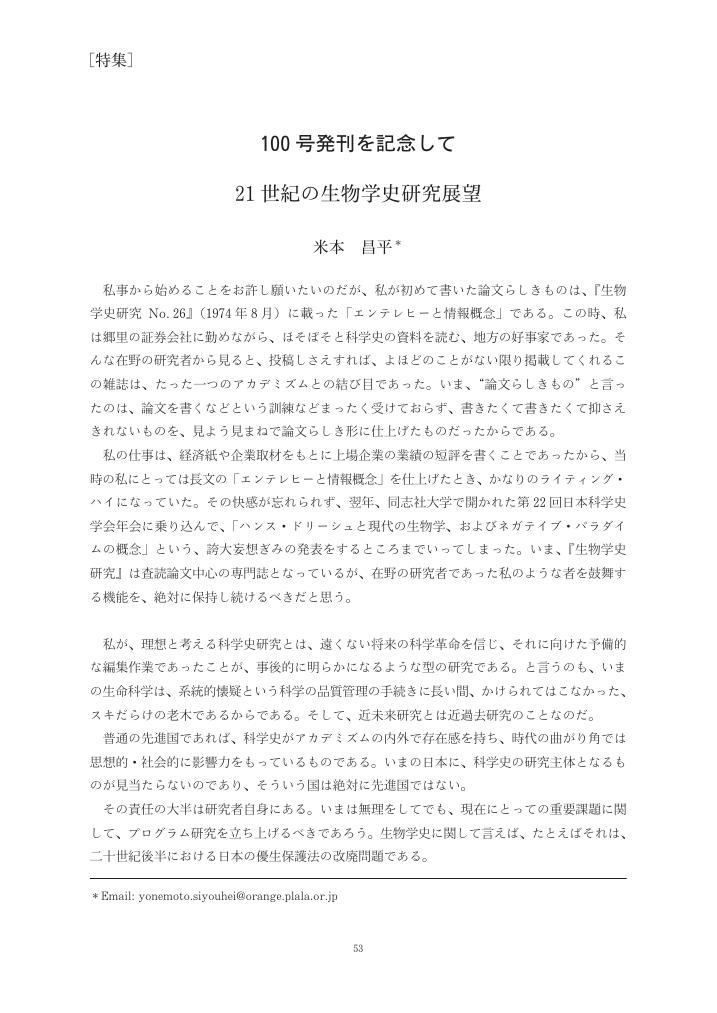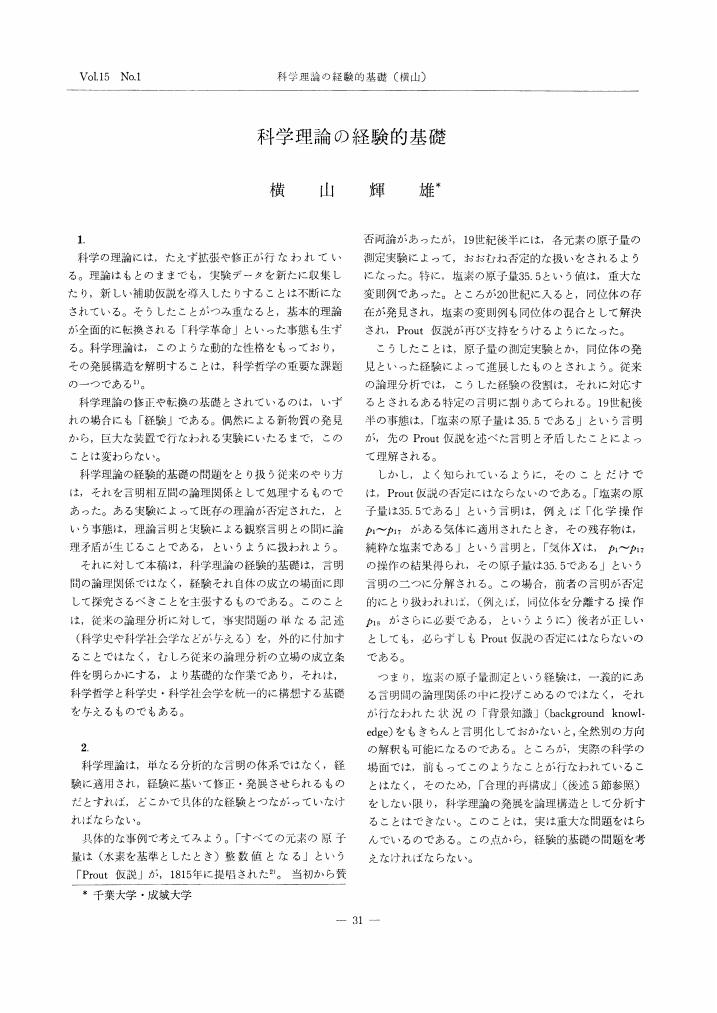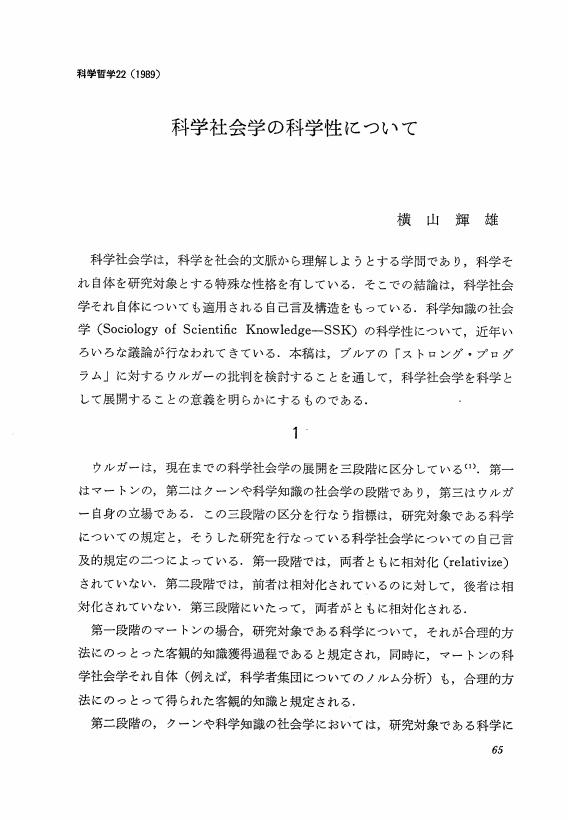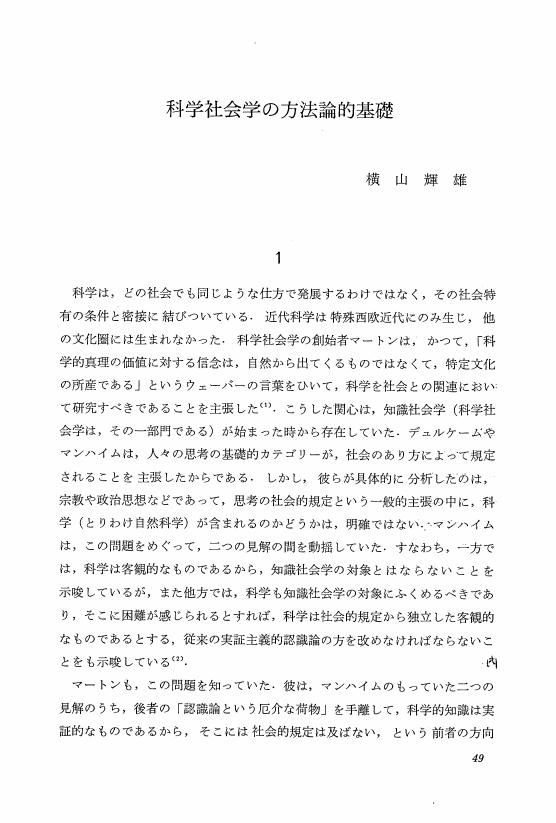19 0 0 0 OA 変異するダーウィニズム : 進化論と社会
10 0 0 0 OA ダ-ウィンの思想的影響 ―「ダーウィン革命」の三段階―
- 著者
- 横山 輝雄
- 出版者
- 公益財団法人 日本学術協力財団
- 雑誌
- 学術の動向 (ISSN:13423363)
- 巻号頁・発行日
- vol.15, no.3, pp.3_42-3_47, 2010-03-01 (Released:2010-10-25)
- 参考文献数
- 12
7 0 0 0 OA 科学史記述の二類型
- 著者
- 横山 輝雄
- 出版者
- 南山大学
- 雑誌
- アカデミア. 人文・自然科学編 = Academia. Humanities and natural sciences (ISSN:21853282)
- 巻号頁・発行日
- no.15, pp.1-8, 2018-01-31
6 0 0 0 OA 科学哲学の現代的課題
- 著者
- 横山 輝雄
- 出版者
- 科学・技術研究会
- 雑誌
- 科学・技術研究 (ISSN:21864942)
- 巻号頁・発行日
- vol.7, no.1, pp.5-14, 2018 (Released:2018-07-05)
「科学哲学」という日本語は、一般には「科学についての哲学的考察」として「科学とは何か」「科学の意義」などを論ずるものと思われているが、実際には英語のphilosophy of science にあたる狭く限定されたものであり、そうした問題を扱わない。「科学哲学」に一般に期待されている内容は、科学史、科学社会学、科学技術社会論などの「科学論」(science studies)と呼ばれている分野で議論されてきた。それらの成果を概括して「科学と技術」「科学と倫理」「科学と宗教」などの問題を扱う科学哲学が現在求められている。
4 0 0 0 OA 進化論と分類の原理
- 著者
- 横山 輝雄
- 出版者
- 日本科学哲学会
- 雑誌
- 科学哲学 (ISSN:02893428)
- 巻号頁・発行日
- vol.31, no.2, pp.17-25, 1998-11-15 (Released:2009-05-29)
Whether the natural classification of plants and animals is possible or not is an important problem of philosophy of biology. Because of the acceptance of the theory of evolution, "the death of essentialism" is widely held. But an extreme conventionalist's view that every classification is artificial is not correct. In this paper I propound a view that the natural classification is possible in some sense. The natural classification has its roots in "folk taxonomy" and is necessary for human beings. The natural classification is different from phylogenetic classification. We should distinguish phylogenetical study of the evolutional history from taxonomy or classification, especially the natural classification.
- 著者
- 原 塑 鈴木 貴之 坂上 雅道 横山 輝雄 信原 幸弘
- 出版者
- 北海道大学科学技術コミュニケーター養成ユニット(CoSTEP)
- 雑誌
- 科学技術コミュニケーション (ISSN:18818390)
- 巻号頁・発行日
- vol.7, pp.105-118, 2010-02
Recently, some scientific disciplines have been politically promoted in many countries, because governments believe that they can produce economically profitable knowledge, and that neuroscience belongs to these disciplines. They are aptly characterized by Jerome Ravetz's notion of "post-normal science." It is expected that some knowledge produced by neuroscience may, when applied to the real world, influence social systems and, ultimately, our views on what it is to be human beings, even though it is difficult for us to foresee its concrete impacts. To minimize its unexpected negative effects, even non-specialists need to have neuroscience literacy, which includes not only a basic theoretical knowledge of neuroscience, but also knowledge on its social significance and possible impacts on our self-understanding as human beings. We compiled a textbook of neuroscience literacy, and used it in liberal arts education. In this article, we document our project of education on neuroscience literacy in liberal arts, and discuss its social and epistemological meaning.
3 0 0 0 OA 科学における認知的価値と社会的価値
- 著者
- 横山 輝雄
- 出版者
- 科学・技術研究会
- 雑誌
- 科学・技術研究 (ISSN:21864942)
- 巻号頁・発行日
- vol.11, no.1, pp.37-41, 2022 (Released:2022-06-28)
科学と社会の関係が変化し、科学者は自分の専門領域で研究を進めるだけでなく、社会に対して積極的にかかわることが求められるようになり、「科学者の社会的責任」についても新たな視点が求められている。「科学と価値」の問題について科学哲学でなされてきた「認知的価値」と「社会的価値」についての議論,とりわけクーンやラウダンのそれを、科学技術社会論における、ラベッツの「ポスト・ノーマル・サイエンス」や、コリンズの「科学論の第三の波」の議論と関連させて、科学と社会の関係におけるタイプの違いを区別する必要がある。「不定性」がある場合、科学においても参加型が求められ非専門家の関与がなされるが、その場合社会的価値と認知的価値を区別し、専門家の暗黙知の役割に配慮することが必要である。
3 0 0 0 OA 脳科学と科学研究の目標設定
- 著者
- 横山 輝雄
- 出版者
- The Philosophy of Science Society, Japan
- 雑誌
- 科学哲学 (ISSN:02893428)
- 巻号頁・発行日
- vol.42, no.2, pp.2_1-2_11, 2009 (Released:2010-02-15)
- 参考文献数
- 16
Neuroscience is now very popular and many research projects are going. The purpose of this paper is to examine what kind of ideology is required to promote neuroscientific research. Aim of applied science is easily understood by society. In the case of pure science or basic science, the aim is “to reveal the truth”. But such abstract idea is not sufficient to get financial support from society. Genetics has an ideology of “gene reductionism”. Dawkins coined the term “selfish gene” and it had a strong influence in society. Neuroscience needs such kind of ideology and term to appeal to society.
2 0 0 0 公共圏の中の科学技術に関する科学論的・政治哲学的研究
現代社会における科学技術が、知的、物質的威力としてのみではなく、権力や権威を伴う政治的威力として機能していることの分析を行い、科学者共同体において確保される知的「正当性」と、科学技術が関連する社会的意思決定において科学知識が果たす「正統性」提供機能の錯綜した関係を解明し、論文集を出版した。また、このような状況における科学技術のガバナンスのあり方として、科学技術の専門家や行政関係者のみならず、広く一般人を含む多様なステークホルダーの参加の元での合意形成や意思決定様式の可能性を探求した。特に、科学者共同体内部で作動する合意形成様式の社会学的分析に関する著作、幅広いステークホルダー参加の元手の合意形成の試みのひとつであるコンセンサス会議の分析に関する著作が、その成果である。さらに具体的な事例分析のために、参加型のテクノロジーアセスメントにおける多様な試みを集約するワークショップを開催し、現状の成果と今後の課題を明らかにした。課題としては、全国的なテーマと地域的なテーマで参加手法はどういう違いがあるべきか、参加型手法の成果を政策決定とどのように接続する課などである。同時に、「もんじゅ裁判」を事例に、科学技術的思考と法的思考、そして一般市民の視点のずれと相克を記述分析し、社会的紛争処理一般にかかわる問題点や課題を明らかにした。本研究の結果到達した結論は、人々の現在及び将来の生活に大きな影響を与える科学技術のあり方に関しては、政治的な捕捉と検討という意味での公共的討議が必要であり、そのための社会的仕組みを構想していく必要があるということである。こういった活動の成果は、最終年度にパリで開催された4S(Society for Social Studies of Science)国際大会でセッションを組んで報告された。
1 0 0 0 OA 特集 100号発刊を記念して
1 0 0 0 OA シンポジウム:科学史研究と哲学 : 2002年度年会報告
1 0 0 0 OA 書評
1 0 0 0 OA 科学理論の経験的基礎
- 著者
- 横山 輝雄
- 出版者
- 科学基礎論学会
- 雑誌
- 科学基礎論研究 (ISSN:00227668)
- 巻号頁・発行日
- vol.15, no.1, pp.31-35, 1980-12-30 (Released:2009-07-23)
- 参考文献数
- 18
1 0 0 0 OA デュエムと現代科学哲学
- 著者
- 横山 輝雄
- 出版者
- 日本科学哲学会
- 雑誌
- 科学哲学 (ISSN:02893428)
- 巻号頁・発行日
- vol.29, pp.31-43, 1996-11-15 (Released:2009-05-29)
Duhem-Quine thesis that a single theory can never be tested and decisively refuted by experience is well known among philosophers of science. But Duhem himself did not argue for that thesis. His argument was restricted within physical theories.Duhem has been interpreted as an instrumentalist or conventionalist. But he did not deny the existence of a reality behind the theory. Duhem's realism is very different from contemporary scientific realism. To understand his philosophy of science, it is important to note that he was a Pascalian and argued for intuition as well as logic. His philospophy of science is similar to that of M. Polanyi.
1 0 0 0 OA 科学的説明に関する二つのパラダイム
- 著者
- 横山 輝雄
- 出版者
- 日本科学哲学会
- 雑誌
- 科学哲学 (ISSN:02893428)
- 巻号頁・発行日
- vol.26, pp.15-24, 1993-11-20 (Released:2009-05-29)
1 0 0 0 OA 科学社会学の科学性について
- 著者
- 横山 輝雄
- 出版者
- 日本科学哲学会
- 雑誌
- 科学哲学 (ISSN:02893428)
- 巻号頁・発行日
- vol.22, pp.65-76, 1989-11-10 (Released:2009-05-29)
1 0 0 0 OA 科学社会学の方法論的基礎
- 著者
- 横山 輝雄
- 出版者
- 日本科学哲学会
- 雑誌
- 科学哲学 (ISSN:02893428)
- 巻号頁・発行日
- vol.13, pp.49-60, 1980-11-20 (Released:2009-05-29)
1 0 0 0 OA ダーウィン革命と二つの自然観
- 著者
- 横山 輝雄
- 出版者
- 日本哲学会
- 雑誌
- 哲学 (ISSN:03873358)
- 巻号頁・発行日
- vol.2004, no.55, pp.74-89,22, 2004-04-01 (Released:2009-07-23)
- 被引用文献数
- 1
Origin of Species by Charles Darwin was published in 1859. Darwininan Revolution took place in the 19th century. Ernst Mayr says that now almost everyone is Darwinian and that the only excepton is "creationst" in the US. But the statement about evolution by Pope John Paul II was issued in 1986. Darwin's Dangerous Idea by Danieil Dennett was pubulished the same year.Why Darwinian Revoluiton is contemporary issue in the 21st century.Until 1970s Darwinian Revolution was restrictede within natural science. Darwin, Huxley and other evolutionalisits were not materialist or naturalist about philosophical or ethical problems. After the Meiji Restoration Japanese society accepted theory of evolution in natural science but did not accepted philosophical materialism or naturalism.After "life science turn" in 1970s Darwinian Revolution is taken seriously by philosophers. The central question of Darwinian Revolution is about naturalism or materialism. The concept of natural selection is also the critical issue. The anthropic principle or observation selection effect is discussed in philosophy of cosmology. That concept is also significant in philosophy of biology.
1 0 0 0 OA ブタペスト宣言と科学リテラシーの転換
- 著者
- 横山 輝雄
- 出版者
- 科学・技術研究会
- 雑誌
- 科学・技術研究 (ISSN:21864942)
- 巻号頁・発行日
- vol.8, no.1, pp.3-4, 2019 (Released:2019-08-03)
1 0 0 0 カント「判断力批判」における機械論と目的論
- 著者
- 横山 輝雄
- 出版者
- 日本科学史学会生物学史分科会
- 雑誌
- 生物学史研究 (ISSN:03869539)
- 巻号頁・発行日
- no.30, pp.p32-40, 1976-11








